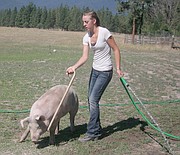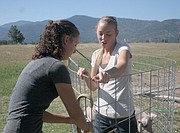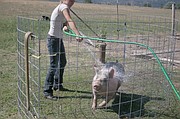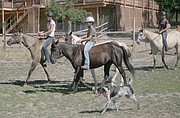Three Plains sisters prepare for Fair
PLAINS – Three sisters – last name is Sweet - that have a shared love of raising animals will soon showcase their 4-H projects at the Sanders County Fair after months of preparation and training.
Valeria, 18, Mahala, 15, and Marcada, 12 all are members of Plains 4-H club, and all three each raising a market pig and yearling/colt horse. They also will showcase older horses at Fair.
Each morning, the Sweet sisters rise early for chores. They take care of not only their many 4-H projects, but also the family sheep, goats, other horses and other pigs on the family ranch located 6 miles outside of Plains.
Following the completion of their chores, they then exercise and work with their market pigs.
For Valeria, this year participating in 4-H marks her fifth pig. For Mahala, this is her seventh pig, and for Marcada, it is her third pig to take to market.
The breeds of the sisters’ pigs are Yorkshire/Hampshire Duroc and they are all from the same litter.
“They’ll be six months old by Fair,” Mahala said while leading her pig from the pen. “And they have to be at least 210 pounds to show at Fair.”
All three pigs fit the requirements, and each day as Fair nears, the girls bathe the pigs. Bath time for the three pigs is not the most pleasant experience, according to the girls.
“They love the water, but hate to be put in the chute and scrubbed,” Valeria explained. As she and Mahala began wrapping bungee cords through the fencing, a chicken-wire ‘chute’ that holds the pigs in one area, Marcada began hauling the water hose to them. It’s a daily team effort. Mahala got in with her pig, the “whitest” of the three, and explained the importance of scrubbing and keeping the pigs clean.
“We try to keep them clean as Fair gets closer,” Mahala said. “Because the scrubbing gets rid of dead and dry skin, which makes it easier to wash mud or dirt off them, otherwise it cakes on and is really hard to get off. And at Fair, we have to clean them quickly before showing.”
When the pigs are brought in for judging at the 4-H area of the fairgrounds, the judges examine how the participants handle the pigs as well as the meat value. Showmanship and market meat value are the main two factors, and the Sweet sisters are seasoned participants; however, they all agreed that they learn something new each year they do a project – animal or not.
Not only do they girls maintain the pigs’ cleanliness, they also feed them twice a day and excecise them by walking them back and forth up the hill that is next to the pen. With the use of their canes, they train and direct the pigs to walk certain directions. For the most part, the pigs are content to graze and a lot like dogs, they follow their noses – or snouts – towards certain smells. This year’s batch of pigs all have good dispositions, and Mahala recalled one year where that was not the case.
“My first year with a pig was one that was real aggressive,” Mahala said. “It would attack the other pigs in the pens [at the fairgrounds], and they had to use boards to keep it controlled at auction. It was fun.”
As for their other projects, the Sweet sisters will show yearling-colts, as well as three older horses for breeding.
This is their first year to show in the young horses categories. Valeria and Mahala’s colts are two years old, while Marcada’s horse is a yearling. They spent the whole of winter and spring training their young horses in things such as groundwork and taking cues from them as riders.
“Last year it was about preparing to ride them,” said Valeria. “We worked on their groundwork, saddling, and getting them desensitized.”
The girls, except for Marcada because her yearling Jules isn’t quite ready, were riding their horses in April. They have leased their colts from neighbor and 4-H volunteer leader Michele McGuigan, who often helps the girls with training horses.
In return, the girls work for McGuigan with chores and animal maintenance.
“They have put in a lot of time and effort into [the colts] and it’s showing,” McGuigan said as she watched the girls bareback over to her place to saddle up.
The girls’ young horses will be judged on showmanship and horsemanship, based on a set pattern they will give to the girls to take their colts through while on saddle. That is where all the groundwork training comes into play.
“It gets them ready for riding. So when you’re on the horse, they’ll do the same things,” said Mahala, who rides her colt, Chance. Mahala got to watch Chance’s birth two years ago and the two have been pals ever since.
Once the girls saddled up their horses, they mounted up and began taking their horses through steps and leg cues.
“It’s basically getting them to move off your leg [cues],” said Valeria. “We want to get them good to lead from our cues.”
“Yeah, like tapping your feet together is ‘forward,’” Mahala said and then showed on Chance, who stepped forward.
The girls also explained how they’ve trained the colts on turning on their haunches, or back legs, instead of on their front. Marcada was still working with Jules on that, and from the back of her 9-year-old mare, Cali, who led Jules around as well.
“When we started them, we had to get them to give to the bit and bridle,” Valeria said. “And now that we’re riding them, it’s just about learning cues.”
To prepare for Fair, the girls work with their horses for two hours, three times a week.
“What I really love about 4-H is that it’s a self-directive program, and the girls have really developed a strong work ethic,” mother of the girls, Deseri McNabb, said. “It’s all positive, and open to all ages. I like how the older kids help out the younger ones.”
As the Sweet sisters count down the days until Fair, they keep their projects ready and hope to do well in judging and at auction. For whatever they earn at auction, they put away in savings for college, or for purchasing more animal-related products.









